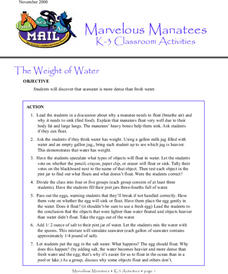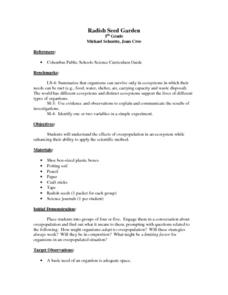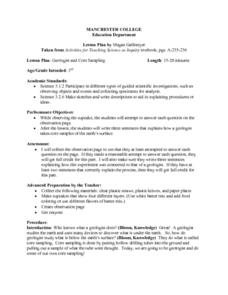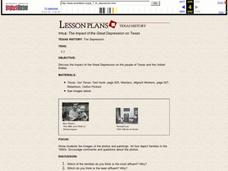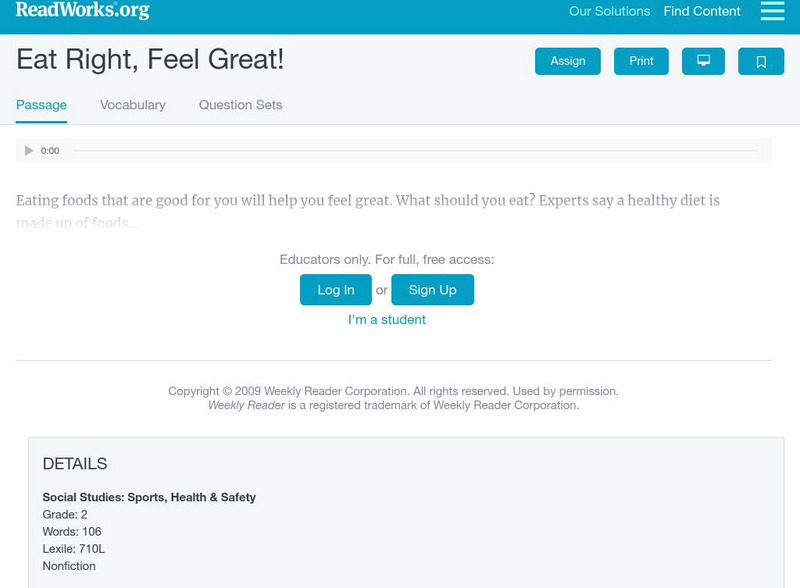Curated OER
Bleach Chemical Reactions
Students learn what happens when bleach comes in contact with various cloth fibers, chemical colors, nature and synthetics.
Curated OER
It's Time to Get Organ-Wised
Students engage in a lesson which contains several ideas for a unit on the body and body organs. They solve riddles, color in shapes of organs, participate in games and read about the functions of the various organs. Worksheets are...
Curated OER
Utah Indian Contributions
Fourth graders study the contributions from the Utah Indian tribes and present their finding either orally or in a PowerPoint.
Curated OER
From Seed to Plant
Students adopt seeds, recording their observations as they draw their seeds, germinate them, and plant their seedlings using the hydroponic method. Students maintain journals recording their germination experiments.
Curated OER
It Looks Like Champagne
Students determine some practical implications of the discovery of liquid carbon dioxide in deep-ocean ecosystems. They interpret phase diagrams and explain the meaning of "critical point" and "triple point."
Curated OER
The Weight of Water
Students participate in an experiment about the weight of water. They work together to discover that seawater is more dense than fresh water. They also determine which objects float and sink.
Curated OER
Make a Comet Model and Eat It!
Students create models of comets. They develop a comet model in a team and exchange samples with other teams. They use their senses to demonstrate the filters on a spectrometer and record their data. They discuss the contents of their...
Curated OER
Ground Beef Lab - Open-Faced Tacos
Students will use ingredients and read a recipe to create open faced tacos. The emphasis of the lesson is the kind of preparation that is needed to cook ground beef correctly to avoid diseases associated with improper preparation...
Curated OER
Comparative Embryology Using Japanese Medaka Fish
Students conduct an experiment to control the breeding of Japanese Medaka fish. They collect the fertilized eggs and view and record the fish's embryological development daily to compare the stages to human development.
Curated OER
Radish Seed Garden
Fifth graders explore the effects of overpopulation in an ecosystem while applying the scientific method. They discuss overpopulation and its meaning. Students as an organism competes for space in an overpopulated area. They plant...
Curated OER
Geologist and Core Sampling
Third graders observe a cupcake and attempt to answer each question on the observation page. They write three sentences that explains how a geologist takes core samples of the earth's surface. Students make sketches and write...
Curated OER
Penguins and Their Habitats
First graders research and observe penguins in their natural habitats. They conduct Internet research, complete a penguin WebQuest, and compile information on a selected type of penguin. Using their research information they create a...
Curated OER
Changing unhealthy eating habits
Learners identify the elements of a balanced diet, then compile a daily diet and exercise log to assess their lifestyles and improve them if applicable. They recognize and explain the importance of proper nutrition practices.
Curated OER
The Impact of the Great Depression on Texas
Seventh graders examine and discuss photographs taken during the Great Depression and the impact of the Great Depression on the U.S. They write research reports and create a mural depicting the lives of rural and urban families in the...
Curated OER
Marine Communities
Students view a video and then complete lab exercises to help them explain marine communities and animals in them.
Curated OER
The Impact of Civil War and Conflict on Identity
Students view and discuss Powerpoint presentation on Colombian Conflict, examine how civil war impacts the common person, review vocabulary, and complete critical thinking questions with classmates.
ABCya
Ab Cya: Take a Trip Food Groups Jr
Take a Trip: Food Groups Jr is a learning activity that challenges children to carefully move the hungry ant through the picnic table maze to the food at the end of the table. Children will be introduced to the different food groups...
Read Works
Read Works: Eat Right, Feel Great!
[Free Registration/Login Required] An informational text introducing the four food groups of a healthy diet. A question sheet is available to help students build skills in reading comprehension.
Alabama Learning Exchange
Alex: A Revolutionary Dinner Party
Students play the role of colonists from the Revolutionary War period. Each group has decided to host a dinner party for some "famous faces" of the American Revolution. There are FOUR parts to this project: research, seating chart, music...
Alabama Learning Exchange
Alex: Habitats
What is a habitat? In this lesson, students will identify that a habitat has four elements, food, water, shelter, and space. Students will identify their own habitat and create a brochure describing the habitat in terms of food, water,...
A-Z Animals
A Z Animals: Animal Facts: Oyster (Ostreidae)
Provides photographs and a fact card about the oyster. Discusses where they are found, physical characteristics, the four groups of oysters, how they filter water for food using their gills, predators, reproduction, and the impact of...
Utah Education Network
Uen: Decoding Two Syllable Words
The lesson will focus on reading and writing to meet a Phonics and Word Recognition standard: decode two-syllable words following basic patterns by breaking the words into syllables. The lesson is a review of two-syllable words using a...







